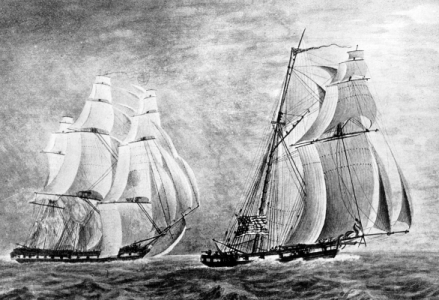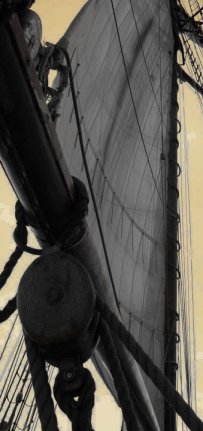The Capture of Arrow and the Making of HMS Whiting

HMS Andromache chasing a schooner
Michael Higgins
The schooner Arrow, bound from Bordeaux for Baltimore, was seized pursuant to British Orders in Council as she was trading with France. Arrow, whose cargo included silk, brandy, champagne, almonds, dress goods and toys was captured by the Royal Navy frigate HMS Andromache (38) Captain Sir George Tobin, on 8 May 1812. The capture of Arrow was one of the final captures under the Orders in Council - which were repealed on 16 June 1812 – two days prior to America’s declaration of war.
As distressing as the Orders in Council were to Americans, the greatest insult to American pride stemmed from the interdiction of American Naval and Merchant shipping and came in the form of impressment. As a result of her various blockades and naval activity against France, Great Britain was in dire need of seamen. Under normal circumstances, if the captain of a British warship needed men he would enter a British port and engage a press gang to fill the empty ranks. At sea, he might stop a neutral ship and take off any bona fide British subjects or persons who were "presumed" to be British subjects. This practice precipitated The Leopard Affair which involved HMS Leopard attacking USS Chesapeake off Virginia, severely damaging the frigate Chesapeake, killing three American seamen and wounding 18 others. America was outraged. Anglo-American relations further deteriorated.

Seaman Kidd's desperate plea, which appeared in the 29 August 1810 issue of the Salem newspaper Essex Register of Essex County, Massachusetts, bore grim testimony to a political reality:
'James Kidd, of Haverhill, Mass. is an impressed Seaman on board His B.M,'s Brig Grasshopper, and wishes his friends to make application for his release'
Impressment was most certainly offensive to Americans. However, as problematical as British impressments were for America, the French were not without fault. Napoleon lied outright to President Madison when he claimed he repealed the Decrees of Berlin and Milan. The Decree of Berlin, pronounced a French blockade of English ports; and the Milan Decree, maintained France would confiscate any ship having any contact with British ports, boarded by British officers or paid a British tax. The French were still seizing American ships on the high seas. Between 1803 and 1812 the French and British seized 1500 American vessels.
Arrow was sent in to Plymouth for adjudication with 6 seamen and 2 marines as a prize crew. Arrow was brought into Plymouth together with the American Schooner Tantivey, under escort of HMS Armide (38) Captain Lucius F. Handyman, Arrow's crew arrived in Plymouth before the declaration of war by America, in which case there was no reason for them to have been taken to Dartmoor Prison.
Between 15 June 1812 and 2 January 1813 Arrow was in Plymouth Dockyard re-fitting for Royal Navy Service as HMS Whiting, with Lt. George Hayes R.N. in command. On 25th February she sailed for the Bay of Biscay to join HMS Iris, HMS Medusa, HMS Scylla, HMS Surveillante, HMS Sparrow, and HMS Bramble operating against American privateers and the trade between America and France.


